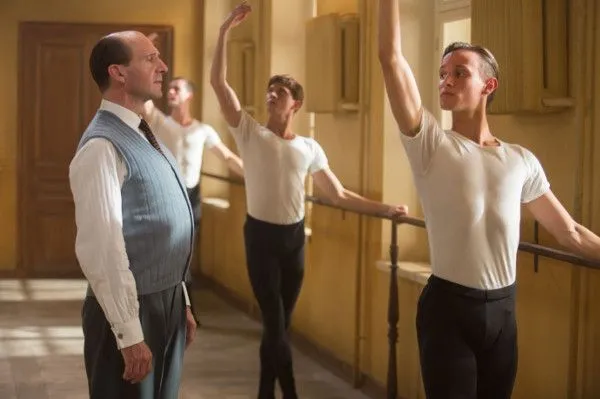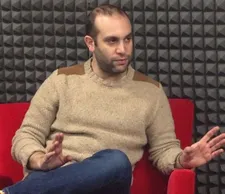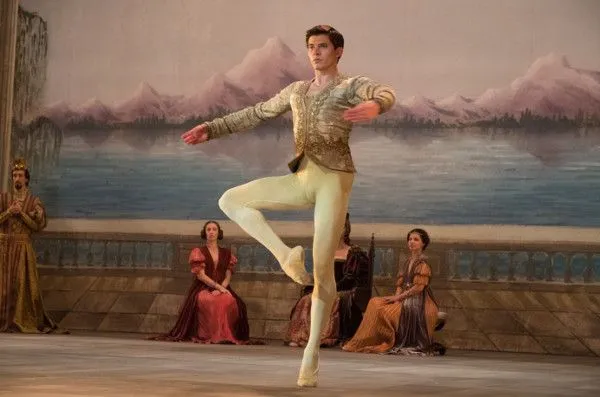 |
| The White Crow. Ilan Eshkeri: 'I find working with Ralph to be a very happy collaboration and I’m always very proud of the work that I’ve done' |
Ralph Fiennes' The White Crow charts the life of ballerina Rudolf Nureyev in three distinct time periods - as a child, his early days as a dancer in Moscow and in Paris on the brink of his defection to the West. The film co-stars Fiennes as his dance coach Pushkin and later charts his relationship with Clara Saint (Adèle Exarchopoulos). The film is scored by Ilan Eshkeri - his third collaboration with Fiennes - and we caught up with him ahead of the film's release to talk about the challenges of the story.
Amber Wilkinson: This is your third collaboration with Ralph Fiennes, has your relationship evolved as you’ve gone along?
Ilan Eshkeri: When I first met Ralph [for Coriolanus], he was terrified of any kind of music at all. I remember we met up and we were talking about it and he said: “It would be great if my character walks onto the screen and when he walks on, could we have a drum that goes [makes sound of one drum beat], and then I say these lines to my mother, and then she walks off and could we have another drum that goes [makes the sound of one drum beat].” And I said: “Yeah, Ralph, we can do that. But I was thinking, because you’re a soldier, how about if we have a trumpet?” And I could see this look of alarm on his face. I said: “Not playing any tunes, just playing one single note.” And that he could kind of live with. And that’s how we made the score for Coriolanus, just out of these sorts of sounds, percussion and a note of trumpet here and a note of trumpet there. It was extremely minimalist on some level, although it was quite extreme on another level. We used no reverb on the musical score at all – if you ever listen to it on headphones, it’s a really weird listen. It was very hard to mix.
 |
| Ilan Eshkeri: 'Doing all the ballet work was extremely complicated on a technical level' Photo: Maike Eilert |
AW: In something like The White Crow it is unavoidable, in that if you’re going to have any dancing, you’re going to have to have some music to dance to. But there’s also quite a lot of music away from the dance scenes.
IE: I did all the repertoire that the dancers dance to – we recorded all that in advance of the film because we had to as the choreography is incredibly complicated and difficult. We had to go into archives in Russia to find all bits of music. I wrote music for the film as they were editing it. The idea was that I would write these classical pieces of music that would then be cut into the film, so that you would get the feeling that it was all ‘found music’. The music doesn’t work like cues, it works like, “We found this piece of classical music and put it in”.
AW: There’s classical music by the likes of Tchaikovsky in there as well, though. Yes, there’s tons of that.
AW: How that was for you, is it scary to approach the composition when you’re writing something that fits in with all those other bits of classical music people may be familiar with?
IE: Of course, it’s terrifying if you start to think about it in that way. It’s most helpful to try not to worry about it. When I sit down and I write a piece of music in front of a piano keyboard, you’re sat down in front of the same 88 black and white notes that Wagner has sat in front of, that Tchaikovsky has sat in front of and if you think about it like that… how do you even begin that, it’s terrifying. So, I thought in practical terms of the kind of orchestra I was using, the kind of style I was writing in and just wrote some music and hoped for the best.
AW: With the film having three distinct time periods, did that allow you to be a bit more playful in the way you were approaching the music.
IE: I wanted to have something that was about Russia and about his childhood in Ufa and about being in Leningrad – for me that was one period in his life. Then, for me, he turns into this other thing when he comes to the West and to Paris. That music was a lot more modern and contemporary. I chose a more minimalist Steve Reich approach because I wanted it to be that he is steeped in this classical world, then he arrives in Paris and it’s the Swinging Sixties and suddenly there are all these other possibilities. So that, for me, was the music that accompanied him – it needed to be something else and suddenly new by comparison to the music he grew up with.
On my mother’s side, my grandfather was Russian. He was the musician in the family and I have his violin still, so for me that was what I drew on. That was the personal approach. Then when I realised there was a lot of violin music, I went to Deutsche Gramophone and started looking for an artist and we were lucky enough to get Lisa Batiashvili to play it.
AW: There also seem to be quite a few parts where the woodwind seems to come to the fore as well.
IE:Woodwind sounds quite old fashioned and so it’s not in the forefront. But I wanted the music to sound very classical so it was a good opportunity for woodwind.
AW: In terms of working with the ballet elements, you’ve written a couple of ballets yourself recently. Did that help?
IE: My life’s been full of dance recently but also my mum was a dancer for a while so she took me to the ballet. It was always a dream of mine to write ballets. I’m putting another one together at the moment for next year and that’s been a wonderful creative outlet for me alongside the other work I’m doing. Of course, that knowledge helped me to write the kind of music that was right for the film and to work with the dancers and the choreographer.
AW: Is the way you work with Ralph different from how you work with other directors or is it always a quite similar process? Does it help that you’ve worked together before?
IE It gives you a short hand. Ralph is… I was going to say, an extraordinary person. He is intense but he’s full of love and positivity and he’s a wonderful person to collaborate with. He’s extremely respectful. He’s never dismissive of anything. If I present him with anything, whatever it is, he takes it very seriously and thinks about it very deeply and we talk about it. I’m very grateful for that. When we work together it’s a genuine creative collaboration and he has a wonderful way of giving you the space and the freedom to be creative in whatever way you want to be while being a great captain of the ship, if you don’t mind the metaphor, keeping you in the right direction.
I find working with Ralph to be a very happy collaboration and I’m always very proud of the work that I’ve done. It’s hard work, he’s very demanding in the most positive ways.
AW: Was there anything that was particularly challenging about this score compared to other ones or anything you particularly enjoyed about it?
IE: There was lots that was challenging. Doing all the ballet work was extremely complicated on a technical level and doing all the research. When you get into it, it’s like, sure, there’s this version of the Tchaikovsky but which version did Nureyev dance to? It’s like this whole world. And we wanted it to be as accurate as possible. Emotionally, for me, this is a film about a person who is trying to find themselves and work out who they are. It’s a person who goes through a crisis of personality. That really spoke to me. Having a kid really changed me in certain ways and made me look creatively at myself and what I want to do and how I want to do things. So, on that level, I really connected with it.
AW: The music is very supportive of the action.
IE: You’re the second person to say that but when I was writing it, I was writing standalone pieces of classical music. I wasn’t trying to write underscore. If you listen to the music on its own, it sounds like classical music, it’s busy, it’s detailed, it’s intricate in a way that a lot of film music isn’t. There’s never a moment of just a quiet, high note. Nothing atmospheric, it’s just music, music, music.
Sometimes the most unlikely of combinations work. The ideas of what we were trying to achieve came together. When it works, it works. I’m very relieved because that was a big anxiety of mine – is this music going to feel like it’s sort of plastered on their and swamping stuff. We’ve got one of the greatest solo violinists playing these full-on themes and these intricate woodwind passages while there’s a guy silently looking at a painting – it’s not what you’d normally get in a movie, so I’m delighted that it’s working for people.
AW: So, what’s next for you?
IE: The ballet. I’m trying to put that together at the moment – there’s an idea and people like it and there’s a choreographer I’m talking to and there’s a very famous theatre where I’d like to put it on. So, it’s not a done deal but I can’t really say much more than that. I’m also working on a huge computer game that I’m very excited about but, again, I’m not allowed to say anything about it. But I love working in the games business. It’s a very fun and positive world to work in. The scripts are really very powerful now, it’s a powerful story about a person having to do something that they wouldn’t normally necessarily have done but having to do it in order to survive.
I think it’s important to do lots of different things. I’ve also got a stage show project about space that came out of my previous collaborations with Tim Peake from when he was on the space station. I’ve been working with the European Space Agency and that’s going to be the next thing that I do. So much of film music currently is functional. There’s nothing wrong with that if you want to be a craftsman, and that’s a brilliant career path, but that’s not what I want to do. I want to be an artist, I am an artist and I’m looking for artistic projects to do.
The White Crow is out in cinemas across the UK on March 22 and in the US on April 26.






















